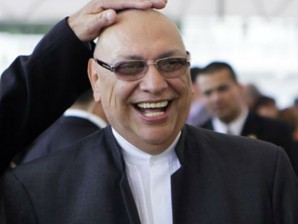
IMPEACHED PRESIDENT. Paraguay's President Fernando Lugo in this file photo was recovering from treatment for what doctors described as three apparently low-grade lymphoma in the groin, chest and the third lumbar vertebra. An impeachment process ended with the ouster of Lugo on Friday, June 22, 2012. The Senate tried him on five charges of malfeasance in office, including an alleged role in a deadly confrontation between police and landless farmers that left 17 dead. Lugo will be replaced by Vice President Federico Franco. (AP Photo/Jorge Saenz, File)
ASUNCION, Paraguay— Paraguay’s Senate voted to remove President Fernando Lugo from office on Friday in an impeachment trial, and the former priest said he would leave even though he considered his ouster as a blow to democracy.
After the rapid five-hour trial, 39 senators dismissed the former Roman Catholic “bishop of the poor,” while four senators voted against and two were absent. Based on the decision, Lugo is to be replaced right away by Vice President Federico Franco of the Authentic Radical Liberal Party.
“I say goodbye as president,” Lugo said shortly after the Senate vote. He said Paraguay’s democracy “has been deeply wounded.”
Crowds of pro-Lugo protesters took to the streets condemning the impeachment trial and expressing support for the president. Police in anti-riot gear drove them back on horseback and using water cannons.
Paraguay’s lower house of Congress voted to impeach Lugo on Thursday. The Senate tried him on five charges of malfeasance in office, including an alleged role in a deadly confrontation between police and landless farmers that left 17 dead.
Venezuelan Foreign Minister Nicolas Maduro, who traveled to Paraguay ahead of the vote as part of a delegation from the UNASUR regional bloc, denounced it as a “new type of coup.”
“A truly shameful act has been committed,” Maduro told reporters.
Lugo decided not to attend the trial, instead watching on television from the presidential palace while his lawyers spoke on his behalf.
The Senate rejected a request by his lawyers for a period of 18 days to prepare their arguments. The Senate’s president, Jorge Oviedo, said there were no grounds for such a request.
Under the country’s laws, Franco is now to serve out the rest of Lugo’s term, which ends in August 2013. The 49-year-old Franco has political experience as a former state governor and at first had been part of a political alliance that supported Lugo.
As protesters paraded through the streets, many schools shut down in Asuncion, and downtown shops closed their doors as a precaution.
Some said Lugo’s quick acceptance appeared likely to avert a more severe and potentially bloody crisis.
“He seems to have handled it very well, considering he had no real opportunity to mount a defense. So far his actions have probably prevented violence,” said Stephen Johnson, director of the Americas Program at the Center for Strategic and International Studies in Washington. “When all the dust settles, Paraguay will need to amend its impeachment procedures to assure a more transparent orderly process. Presidential removal is an area where many Latin American constitutions are weak.”
The impoverished, landlocked nation has a long history of political instability. Lugo was elected four years ago on promises of helping the South American country’s poor, but his more moderate government allies have increasingly turned against him in recent years.
Lugo’s impeachment trial was triggered in part by an attempt by police to evict about 150 farmers from a remote, 4,900-acre (2,000-hectare) forest reserve, which is part of a huge estate owned by a Colorado Party politician. Advocates for the farmers say the landowner used political influence to get the land from the state decades ago, and say it should have been put to use for land reform.
Six police officers, including the brother of Lugo’s chief of security, and 11 farmers died in the clash last week. Lugo’s political opponents blamed the president.
Lugo has expressed sorrow at the confrontation and accepted the resignations of his interior minister and his chief of police.
The president also was tried on four other accusations. They include that he improperly allowed for leftist parties to hold a political meeting in an army base in 2009; that he allowed about 3,000 squatters to illegally invade a large Brazilian-owned soybean farm; that his government failed to capture members of a guerrilla group, the Paraguayan People’s Army, which carries out extortion kidnappings and occasional attacks on police; and that he signed an international protocol without properly submitting it to Congress for approval.
The trial appeared to be a dramatic demise for the once-popular leader who stepped down as the Catholic “bishop of the poor” to run for the presidency amid a leftward swing in South America.
Lugo’s relationship with Franco and the moderate Authentic Radical Liberal Party quickly deteriorated after he was elected in 2008 with their support. His partners were upset after he gave a majority of Cabinet ministry posts to leftist allies, and handed a minority to the moderates.
Conflicts also developed as leftist groups of landless farmers began to invade large soybean and cattle farms, trying to force the government to expropriate them. Lugo’s government didn’t have enough funds to pay compensation to farm owners, and the land seizures upset politicians who previously supported the president.
The political split had become sharply clear as Lugo publicly acknowledged recently that he would support leftist candidates in future elections.